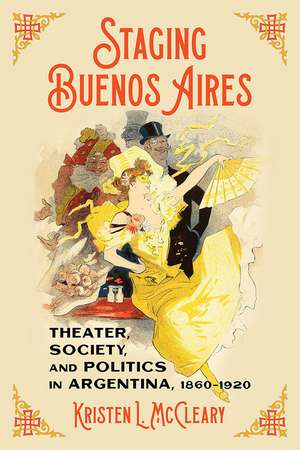Staging Buenos Aires: Theater, Society, and Politics in Argentina 1860-1920: Pitt Latin American Series
Autor Kristen McClearyen Limba Engleză Hardback – 30 apr 2024
Din seria Pitt Latin American Series
-
 Preț: 429.67 lei
Preț: 429.67 lei -
 Preț: 450.40 lei
Preț: 450.40 lei -
 Preț: 355.58 lei
Preț: 355.58 lei -
 Preț: 431.62 lei
Preț: 431.62 lei -
 Preț: 392.66 lei
Preț: 392.66 lei -
 Preț: 388.79 lei
Preț: 388.79 lei -
 Preț: 428.14 lei
Preț: 428.14 lei -
 Preț: 362.33 lei
Preț: 362.33 lei -
 Preț: 416.05 lei
Preț: 416.05 lei -
 Preț: 393.58 lei
Preț: 393.58 lei -
 Preț: 330.31 lei
Preț: 330.31 lei -
 Preț: 394.57 lei
Preț: 394.57 lei -
 Preț: 389.76 lei
Preț: 389.76 lei -
 Preț: 334.31 lei
Preț: 334.31 lei -
 Preț: 388.79 lei
Preț: 388.79 lei -
 Preț: 396.85 lei
Preț: 396.85 lei -
 Preț: 350.79 lei
Preț: 350.79 lei - 17%
 Preț: 445.11 lei
Preț: 445.11 lei -
 Preț: 388.03 lei
Preț: 388.03 lei -
 Preț: 365.05 lei
Preț: 365.05 lei -
 Preț: 457.11 lei
Preț: 457.11 lei -
 Preț: 471.15 lei
Preț: 471.15 lei - 17%
 Preț: 384.07 lei
Preț: 384.07 lei -
 Preț: 428.14 lei
Preț: 428.14 lei -
 Preț: 389.17 lei
Preț: 389.17 lei -
 Preț: 394.65 lei
Preț: 394.65 lei -
 Preț: 429.89 lei
Preț: 429.89 lei -
 Preț: 392.66 lei
Preț: 392.66 lei -
 Preț: 424.88 lei
Preț: 424.88 lei -
 Preț: 389.38 lei
Preț: 389.38 lei -
 Preț: 419.06 lei
Preț: 419.06 lei -
 Preț: 393.58 lei
Preț: 393.58 lei -
 Preț: 354.23 lei
Preț: 354.23 lei -
 Preț: 458.07 lei
Preț: 458.07 lei -
 Preț: 389.76 lei
Preț: 389.76 lei -
 Preț: 363.26 lei
Preț: 363.26 lei -
 Preț: 502.82 lei
Preț: 502.82 lei -
 Preț: 423.91 lei
Preț: 423.91 lei -
 Preț: 395.54 lei
Preț: 395.54 lei -
 Preț: 153.64 lei
Preț: 153.64 lei -
 Preț: 351.72 lei
Preț: 351.72 lei -
 Preț: 383.01 lei
Preț: 383.01 lei -
 Preț: 393.58 lei
Preț: 393.58 lei -
 Preț: 351.55 lei
Preț: 351.55 lei -
 Preț: 351.72 lei
Preț: 351.72 lei -
 Preț: 389.76 lei
Preț: 389.76 lei -
 Preț: 331.86 lei
Preț: 331.86 lei -
 Preț: 358.46 lei
Preț: 358.46 lei -
 Preț: 362.95 lei
Preț: 362.95 lei
Preț: 432.57 lei
Nou
Puncte Express: 649
Preț estimativ în valută:
82.78€ • 88.51$ • 69.01£
82.78€ • 88.51$ • 69.01£
Carte disponibilă
Livrare economică 27 martie-10 aprilie
Preluare comenzi: 021 569.72.76
Specificații
ISBN-13: 9780822948247
ISBN-10: 0822948249
Pagini: 256
Dimensiuni: 152 x 229 x 36 mm
Greutate: 0.68 kg
Editura: University of Pittsburgh Press
Colecția University of Pittsburgh Press
Seria Pitt Latin American Series
ISBN-10: 0822948249
Pagini: 256
Dimensiuni: 152 x 229 x 36 mm
Greutate: 0.68 kg
Editura: University of Pittsburgh Press
Colecția University of Pittsburgh Press
Seria Pitt Latin American Series
Recenzii
“In this book, McCleary deftly reconstructs the golden age of Buenos Aires theater, shedding light on the lively world of playwriters, actors, audiences, impresarios, and critics. She shows that popular notions of race, gender, class, and nation emerged and evolved in the dialogue between stage and house. Between ovations and flops, the reader will get a taste of how democratic entertainment used to be before the mechanical reproduction of art cornered stage performances into an elite pastime.”
—Oscar Chamosa, University of Georgia
“Staging Buenos Aires is a well-researched interdisciplinary work that rigorously examines the multiple facets of urban theater, including popular and middle-class plays, space/place of the theater, audiences, and fire safety. With an impressive bibliography, painstaking research of rare materials and ‘forgotten histories,’ this book is a must-read for scholars, graduate and advanced undergraduate students of Latin American studies, urban studies, performance studies, and theater historians.”
—Yovanna Pineda, University of Central Florida
“Staging Buenos Aires is a unique look at a city and a nation in transition through the lens of popular entertainments and the controversies they provoked. McCleary captures both the fun of theatergoing and the serious issues at play for the people of Buenos Aires when the curtains were raised. Bravo!”
—Brian Bockelman, Ripon College
“McCleary’s deeply researched study argues convincingly for the central role of popular theater in the construction of the Argentine public sphere. By taking seriously the lighthearted entertainments that attracted largely working-class audiences, she sheds new light on urban modernization, shifting gender relations, the immigrant experience, and the racialization of Argentine identity. Perhaps most exciting, McCleary advances a provocative new interpretation of the rise of the nation’s middle class.”
—Matthew Karush, George Mason University
—Oscar Chamosa, University of Georgia
“Staging Buenos Aires is a well-researched interdisciplinary work that rigorously examines the multiple facets of urban theater, including popular and middle-class plays, space/place of the theater, audiences, and fire safety. With an impressive bibliography, painstaking research of rare materials and ‘forgotten histories,’ this book is a must-read for scholars, graduate and advanced undergraduate students of Latin American studies, urban studies, performance studies, and theater historians.”
—Yovanna Pineda, University of Central Florida
“Staging Buenos Aires is a unique look at a city and a nation in transition through the lens of popular entertainments and the controversies they provoked. McCleary captures both the fun of theatergoing and the serious issues at play for the people of Buenos Aires when the curtains were raised. Bravo!”
—Brian Bockelman, Ripon College
“McCleary’s deeply researched study argues convincingly for the central role of popular theater in the construction of the Argentine public sphere. By taking seriously the lighthearted entertainments that attracted largely working-class audiences, she sheds new light on urban modernization, shifting gender relations, the immigrant experience, and the racialization of Argentine identity. Perhaps most exciting, McCleary advances a provocative new interpretation of the rise of the nation’s middle class.”
—Matthew Karush, George Mason University
Notă biografică
Kristen L. McCleary is associate professor of history at James Madison University. Her research explores the intersection between social history and urban culture. She writes about how cultural activities (theater, carnival, film, and music) provide spaces for people to connect and build community, which in turn creates new pathways toward political and social power.
